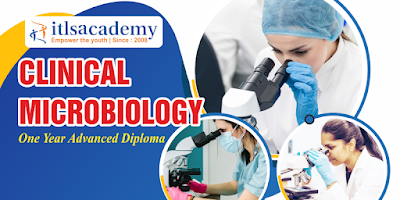Mode: Offline/Online
Clinical Microbiology is a critical branch of medical microbiology that focuses on the detection, identification, and study of microorganisms (like bacteria, viruses, fungi, and parasites) that cause human diseases. It plays a vital role in diagnosing infectious diseases, guiding treatment decisions, and supporting public health surveillance.
🔬 Key Areas of Clinical Microbiology
-
Diagnostic Microbiology
-
Identification of pathogens from clinical specimens (blood, urine, sputum, CSF, etc.)
-
Culture techniques, microscopy, biochemical tests
-
-
Antimicrobial Susceptibility Testing (AST)
-
Determining the resistance or sensitivity of microorganisms to antibiotics
-
Methods: Kirby-Bauer disk diffusion, MIC testing, E-tests
-
-
Molecular Diagnostics
-
PCR, RT-PCR, nucleic acid probes for rapid and specific detection
-
Used for TB, COVID-19, STDs, etc.
-
-
Serology and Immunology
-
Detection of antibodies or antigens in patient samples
-
Used for viral infections (HIV, Hepatitis B/C, Dengue, etc.)
-
-
Infection Control and Hospital Epidemiology
-
Monitoring and preventing nosocomial (hospital-acquired) infections
-
Surveillance and outbreak investigation
-
-
Parasitology and Mycology
-
Diagnosis of diseases caused by parasites and fungi (e.g., malaria, candidiasis)
-
🏥 Clinical Microbiologist Role
-
Work in clinical labs in hospitals, diagnostic centers, and research institutions
-
Collaborate with physicians to interpret lab results and advise on treatment
-
Involved in infection control programs, vaccine development, and epidemiological tracking
🧪 Tools & Techniques Used
-
Gram staining, Ziehl-Neelsen staining (AFB)
-
Culture media (MacConkey, Blood agar)
-
ELISA, Western blot
-
PCR, qPCR, LAMP
-
MALDI-TOF mass spectrometry
-
Automated systems (VITEK, BACTEC)
🎓 Career Path & Skills
Educational Background:
-
B.Sc. or M.Sc. in Microbiology/Medical Lab Technology
-
Specialized diploma or Ph.D. for advanced roles
-
Clinical internship/training is often essential
Skills Needed:
-
Laboratory and diagnostic skills
-
Knowledge of biosafety and aseptic techniques
-
Interpretation of microbiological data
-
Attention to detail, communication skills
🔍 Applications & Importance
-
Disease diagnosis and surveillance
-
Antibiotic resistance monitoring (e.g., MRSA, ESBL)
-
Public health interventions
-
Vaccine development and efficacy monitoring
-
Outbreak investigation and control







No comments:
Post a Comment